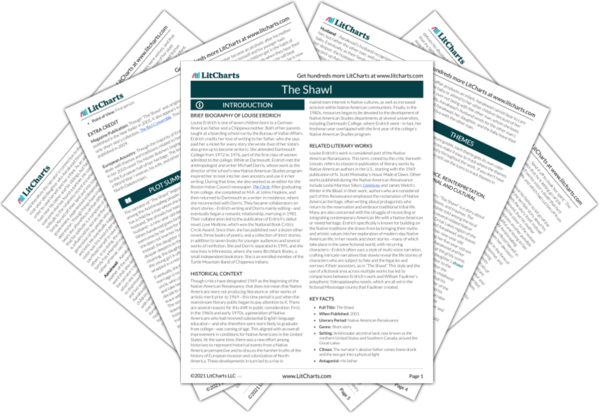Daughter Quotes in The Shawl
It was only after his father had been weakened by the disease that he began to tell the story, far too often and always the same way: he told how when the wolves closed in, Aanakwad had thrown her daughter to them. When his father said those words, the boy went still. What had his sister felt? What had thrust through her heart? Had something broken inside her, too, as it had in him? Even then, he knew that this broken place inside him would not be mended, except by some terrible means … He saw Aanakwad swing the girl lightly out over the side of the wagon. He saw the brown shawl with its red lines flying open. He saw the shadows, the wolves, rush together, quick and avid, as the wagon with sled runners disappeared into the distance—forever, for neither he nor his father saw Aanakwad again.

Unlock explanations and citation info for this and every other The Shawl quote.
Plus so much more...
Get LitCharts A+First, I told him that keeping his sister’s shawl was wrong, because we never keep the clothing of the dead. Now’s the time to burn it, I said. Send it off to cloak her spirit. And he agreed.
The other thing I said to him was in the form of a question. Have you ever considered, I asked him, given how tenderhearted your sister was, and how brave, that she looked at the whole situation? She saw that the wolves were only hungry. She knew that their need was only need. She knew that you were back there, alone in the snow. She understood that the baby she loved would not live without a mother, and that only the uncle knew the way. She saw clearly that one person on the wagon had to be offered up, or they all would die. And in that moment of knowledge, don’t you think, being who she was, of the old sort of Anishinaabeg, who things of the good of the people first, she jumped, my father, indede, brother to that little girl? Don’t you think she lifted her shawl and flew?

Daughter Quotes in The Shawl
It was only after his father had been weakened by the disease that he began to tell the story, far too often and always the same way: he told how when the wolves closed in, Aanakwad had thrown her daughter to them. When his father said those words, the boy went still. What had his sister felt? What had thrust through her heart? Had something broken inside her, too, as it had in him? Even then, he knew that this broken place inside him would not be mended, except by some terrible means … He saw Aanakwad swing the girl lightly out over the side of the wagon. He saw the brown shawl with its red lines flying open. He saw the shadows, the wolves, rush together, quick and avid, as the wagon with sled runners disappeared into the distance—forever, for neither he nor his father saw Aanakwad again.

Unlock explanations and citation info for this and every other The Shawl quote.
Plus so much more...
Get LitCharts A+First, I told him that keeping his sister’s shawl was wrong, because we never keep the clothing of the dead. Now’s the time to burn it, I said. Send it off to cloak her spirit. And he agreed.
The other thing I said to him was in the form of a question. Have you ever considered, I asked him, given how tenderhearted your sister was, and how brave, that she looked at the whole situation? She saw that the wolves were only hungry. She knew that their need was only need. She knew that you were back there, alone in the snow. She understood that the baby she loved would not live without a mother, and that only the uncle knew the way. She saw clearly that one person on the wagon had to be offered up, or they all would die. And in that moment of knowledge, don’t you think, being who she was, of the old sort of Anishinaabeg, who things of the good of the people first, she jumped, my father, indede, brother to that little girl? Don’t you think she lifted her shawl and flew?











